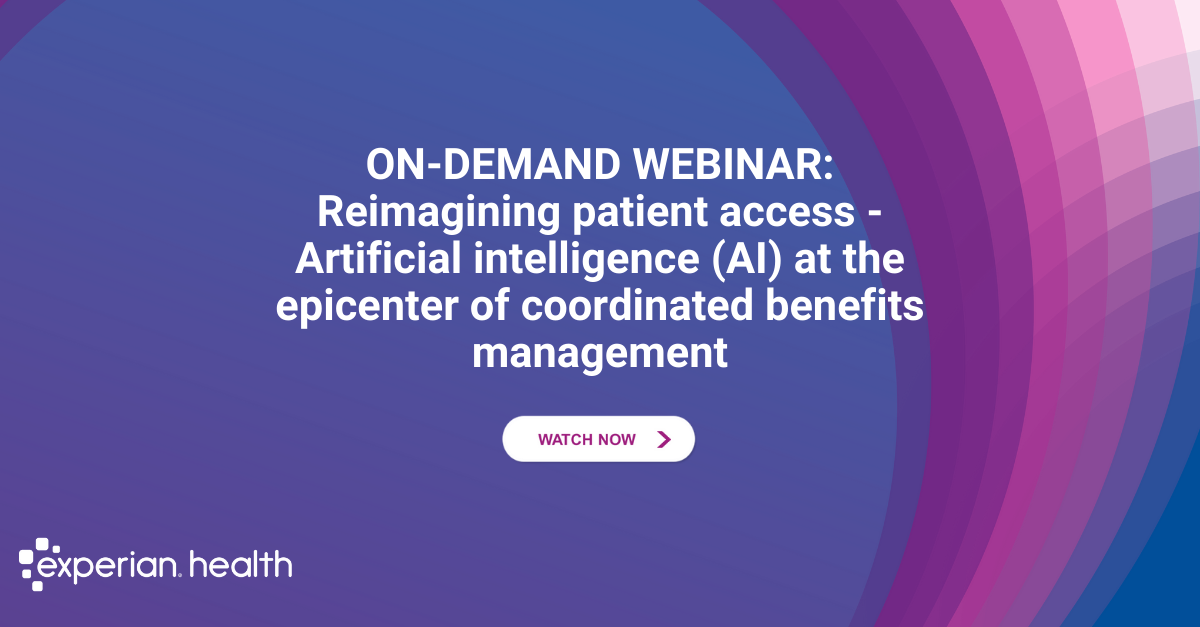At A Glance
Artificial intelligence (AI) is reshaping patient access by reducing manual errors and preventing costly claim denials. Tools driven by AI and automation can streamline eligibility checks and coordination of benefits — helping providers improve efficiency, cut costs, and deliver a better patient experience.
Healthcare claims denials are on the rise, despite more than a decade of industry-wide technological advances aimed at improving claims management processes. However, in recent years, the introduction of artificial intelligence (AI) into the healthcare ecosystem has begun transforming how healthcare organizations manage patient access — and the entire revenue cycle.
This article summarizes a recent webinar with Experian Health’s Vice President of Innovation, David ‘Fig’ Figueredo, and Kate Ankumah, Product Manager for Patient Access Curator™, as they break down how healthcare organizations can use AI to build scalable, data-driven revenue cycle solutions and deliver measurable value across the patient access ecosystem.
Evolution of AI in healthcare
For more than a decade, a progression of technology – mostly rooted in automation – has attempted to solve the issue of rising denials. Today, with the help of AI solutions, the process is shifting away from transactional activities to a more intelligence-driven approach.
AI tools can be implemented at every stage of the revenue cycle to solve persistent challenges – like benefit coordination, eligibility verification, and claims management. And while most providers have the capability to add AI solutions, claims denials continue to climb.
“With all of the investment by organizations like Experian Health and HIS system vendors, there still is a high prevalence of an issue with coordination of benefits and eligibility denials.”
David Figueredo, Experian Health’s VP of Innovation
Figueredo further points out that while revenue cycle leaders are aware of AI and its potential, they often remain skeptical of the technology or are unsure how to best leverage AI tools for denial prevention.
Overcoming perceptions about AI
Healthcare leaders sometimes struggle with negative perceptions around adopting AI solutions. Figueredo notes this is common, and wants organizations to know that with AI, “There’s a lot of power, hope and expectation around the use of applied technologies and automation in the revenue cycle process.”
Concerns about implementing AI for revenue cycle management vary widely. However, according to the results of an Experian Health data study presented during the webinar, “accuracy and reliability” are often a top worry among healthcare organizations considering adopting AI technology.
Other common concerns about leveraging AI solutions include data privacy and security, cost of implementation, staff resistance and labor risk, and lack of transparency. Healthcare organizations also want to base the decision to utilize AI on measurable results. Where in the revenue cycle has AI been implemented? How did it improve denial rates?
Finding a path forward with AI
AI offers healthcare organizations the potential to increase operational efficiencies, reduce administrative burdens, and reduce costs. While many revenue cycle leaders are most willing to place bets on using AI for patient eligibility verification and claims management, barriers to adopting AI still exist. Figueredo notes:
“We’re seeing a lot of organizations that are interested [in AI], but also guarded about its use. Healthcare leaders typically have a specific goal in mind for using AI and want to see real-world results.” He reminds healthcare leaders that with AI, we “can do things we couldn’t do before – but it’s how it’s applied in solving things in the [revenue cycle] process” that really matters.
For many healthcare providers, the question becomes: Does adding AI solutions to the revenue cycle provide acceleration? Improve patient access? Reduce the number of manual touches? Can AI do more of the work consistently so staff labor can be reapplied to other focus areas? Does AI help mitigate ongoing staff shortages? Will it cut costs for healthcare organizations already operating on thin margins?
Adopting AI: RCM best practices
When modernizing the revenue cycle, Figueredo reminds healthcare providers to have a clear set of guidelines and recommends ensuring AI solutions are designed to meet specific revenue cycle goals. Top priorities for healthcare organizations often include:
- Reducing manual interactions: While there are still some situations that require human intelligence to make decisions, countless simple tasks can be automated to minimize manual workload.
- Fixing issues on the front end: Early interventions to proactively correct potential issues with claims before they become a bigger problem, like incorrect patient demographics or eligibility information, can be critical to preventing denials.
- Supporting real-time integration: To avoid relying on batch auditing or poorly informed automated decision-making in the revenue cycle, HIS systems and patient access platforms, like scheduling and billing, must be designed to handle real-time corrections.
Adopting AI for COB with Experian Health’s Patient Access Curator
Turnkey AI tools, like Experian’s Health’s Patient Access Curator (PAC), allow healthcare organizations to implement a comprehensive patient access COB solution that touches every step of the revenue cycle process –starting with patient registration.
PAC consolidates important functions like eligibility checks, MBI, demographics and discovery into one seamless solution to maximize clean claims and minimize denials, appeals and resubmissions. Kate Ankumah, Product Manager for Experian Health’s Patient Access Curator, explains:
“We know that bad data is like a virus. If it starts bad, it ends up on the claim – even if you try to solve it mid-stream, it’s already saved somewhere. At the point of scheduling, at the point of registration, [with the Patient Access Curator], we’re giving you the most accurate data so that it can live and get accurate to the claim.”
Benefits of leveraging AI for COB and claims management
Adopting COB solutions powered by AI and machine-learning, like Experian Health’s Patient Access Curator, healthcare providers can improve overall accuracy during claims processing on the front end –and at every step of the revenue cycle. And when errors are reduced from the start, healthcare organizations typically benefit from less wasted staff time, decreased denial volumes, accelerated denial management, and fewer contingency vendor fees – plus a better patient experience overall.
Patient Access Curator is available now – learn how your healthcare organization can get started and prevent claim denials in seconds.



